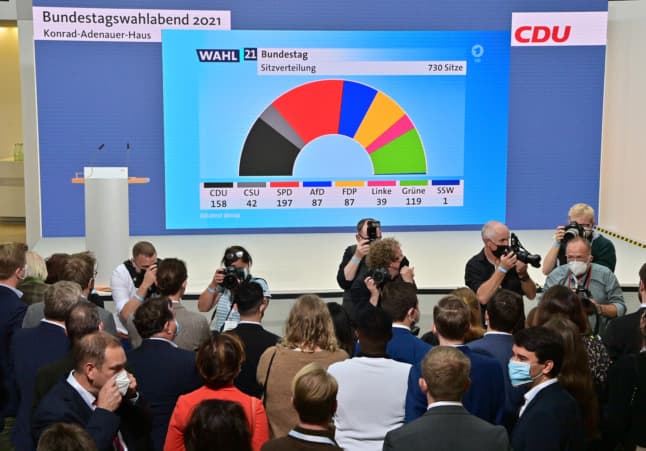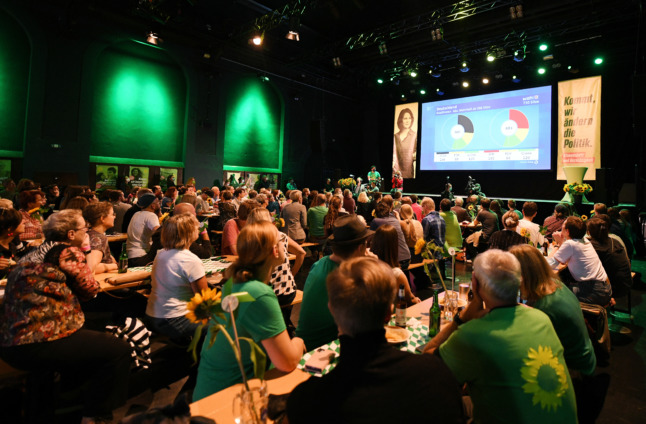Exit polls show German election still too close to call

Olaf Scholz's SPD took a slight lead over Merkel's conservatives in early exit polls on Sunday as pundits struggled to call one of the most unpredictable elections in recent decades.
Preliminary results published on public television after polling stations closed at 6pm found Scholz's SPD with around 24.9 to 25.8 percent of the vote, followed closely behind by Merkel's Christian Democrats and their candidate Armin Laschet on 24.2 to 24.7 percent.
Given the high proportion of voters who mailed in their ballot, the final results could still turn up surprises in what is the most unpredictable election for Europe's biggest economy in decades.
READ ALSO: LIVE: SPD and CDU neck-and-neck in first German election exit polls
But the SPD immediately claimed its right to lead Germany's next government.
"We have fought our way back as the SPD, the SPD is back, the SPD clearly has the mandate to govern," the party's general secretary Lars Klingbeil told public broadcaster ZDF. He added that the SPD's "Olaf Scholz should become chancellor".
Social Democrats cheering as exit polls are announced. #SPD said to have 25 percent of the votes. #btw21 pic.twitter.com/lBeLeqVRiZ
— Anja Koch (@anjk) September 26, 2021
With the conservatives staring down the barrel of their worst post-war result, CDU secretary Paul Ziemiak admitted that the "losses are bitter compared to the last election" in 2017, when the CDU-CSU drew 33 percent.
Armin Laschet, the conservative candidate to succeed Angela Merkel as chancellor, said he still aimed to head Germany's next coalition government even as early estimates showed Merkel's CDU-CSU bloc trailing the Social Democrats.
"We will do everything we can to build a government led by the (conservative) Union," Laschet told supporters in Berlin, adding that the vote outcome "is still totally unclear".
READ ALSO: Election 2021: What a CDU-led coalition could mean for foreigners in Germany
Sunday's epochal election ushers in the end of 16 years in power for Merkel, and also thrusts Germany, a byword for stability, into a new period of political uncertainty.
If the two leading parties remain neck and neck, the CDU-CSU and the SPD could each seek to form governing coalitions in a race for power - a lengthy process that could blunt Germany on the international stage for some time.
Voting earlier in their respective constituencies, Laschet stressed that "every vote counts" in an election that would determine "the direction of Germany in the next years", while Scholz said he hoped summery weather was "a good sign" for his party.
Blunders
The SPD, Germany's oldest party, was polling so badly just a few months back that many had written off the possibility that it may even be in the next government.
But Scholz, a colourless but competent former mayor of Hamburg, now stands a chance of becoming the first SPD chancellor since Gerhard Schroeder, who lost to Merkel in a close contest in 2005.
The conservatives meanwhile could be headed for their worst score post-war even though their candidate Laschet went into the race in the summer as the clear favourite to grab the top job in Europe's biggest economy.
But his popularity began to wane after a series of blunders over the summer, including being caught on camera laughing in the background during a tribute to the victims of devastating floods in Germany.
In the meantime, Scholz, who at the start of the year had looked down and out in the race, saw his ratings begin to rise as he avoided making such embarrassing mistakes.

CDU supporters offer a muted applause after the exit poll results are announced in Berlin. Photo: picture alliance/dpa | Michael Kappeler
With polls predicting a devastating defeat for Laschet, the conservatives trotted out their biggest asset - Merkel.
Although she had originally planned to keep a low profile in the campaign, she found herself dragged into Laschet's frantic tour across the country to canvas for last votes -- something that has helped the CDU-CSU to stem a drop in popularity in the last days of the campaign.
Green role
Meanwhile, although climate change had been one of the top concerns among voters in the run-up to the vote, it has not translated into a sweep for the ecologist Greens.
The Green party enjoyed a surge in support earlier this year after naming 40-year-old Annalena Baerbock as its chancellor candidate, at one point even briefly taking the lead as the most popular party.
But after a series of missteps by Baerbock, including a plagiarism scandal, the Greens fell well behind the two leading parties, the exit polls showing them with around 15 percent of the vote.

Green Party members watch the provisional election results roll in. Photo: picture alliance/dpa | Angelika Warmuth
While the chancellery may be out of reach for the Greens, it will likely have a role in Germany's next government.
On the eve of the polls, Scholz voiced his preference for a partnership with the Greens, calling on voters to give him the score needed to go with a two-way coalition.
READ ALSO: Election 2021: What an SPD-led coalition could mean for foreigners in Germany
Laschet has signalled he could still try to form a coalition even if the CDU-CSU do not come first, most likely calling on the Greens and the liberal FDP for support.
But coming in second would still be a devastating blow for the party, which has dominated German politics since World War II and has never won less than 30 percent of the vote in federal elections.
Comments
See Also
Preliminary results published on public television after polling stations closed at 6pm found Scholz's SPD with around 24.9 to 25.8 percent of the vote, followed closely behind by Merkel's Christian Democrats and their candidate Armin Laschet on 24.2 to 24.7 percent.
Given the high proportion of voters who mailed in their ballot, the final results could still turn up surprises in what is the most unpredictable election for Europe's biggest economy in decades.
READ ALSO: LIVE: SPD and CDU neck-and-neck in first German election exit polls
But the SPD immediately claimed its right to lead Germany's next government.
"We have fought our way back as the SPD, the SPD is back, the SPD clearly has the mandate to govern," the party's general secretary Lars Klingbeil told public broadcaster ZDF. He added that the SPD's "Olaf Scholz should become chancellor".
Social Democrats cheering as exit polls are announced. #SPD said to have 25 percent of the votes. #btw21 pic.twitter.com/lBeLeqVRiZ
— Anja Koch (@anjk) September 26, 2021
With the conservatives staring down the barrel of their worst post-war result, CDU secretary Paul Ziemiak admitted that the "losses are bitter compared to the last election" in 2017, when the CDU-CSU drew 33 percent.
Armin Laschet, the conservative candidate to succeed Angela Merkel as chancellor, said he still aimed to head Germany's next coalition government even as early estimates showed Merkel's CDU-CSU bloc trailing the Social Democrats.
"We will do everything we can to build a government led by the (conservative) Union," Laschet told supporters in Berlin, adding that the vote outcome "is still totally unclear".
READ ALSO: Election 2021: What a CDU-led coalition could mean for foreigners in Germany
Sunday's epochal election ushers in the end of 16 years in power for Merkel, and also thrusts Germany, a byword for stability, into a new period of political uncertainty.
If the two leading parties remain neck and neck, the CDU-CSU and the SPD could each seek to form governing coalitions in a race for power - a lengthy process that could blunt Germany on the international stage for some time.
Voting earlier in their respective constituencies, Laschet stressed that "every vote counts" in an election that would determine "the direction of Germany in the next years", while Scholz said he hoped summery weather was "a good sign" for his party.
Blunders
The SPD, Germany's oldest party, was polling so badly just a few months back that many had written off the possibility that it may even be in the next government.
But Scholz, a colourless but competent former mayor of Hamburg, now stands a chance of becoming the first SPD chancellor since Gerhard Schroeder, who lost to Merkel in a close contest in 2005.
The conservatives meanwhile could be headed for their worst score post-war even though their candidate Laschet went into the race in the summer as the clear favourite to grab the top job in Europe's biggest economy.
But his popularity began to wane after a series of blunders over the summer, including being caught on camera laughing in the background during a tribute to the victims of devastating floods in Germany.
In the meantime, Scholz, who at the start of the year had looked down and out in the race, saw his ratings begin to rise as he avoided making such embarrassing mistakes.

CDU supporters offer a muted applause after the exit poll results are announced in Berlin. Photo: picture alliance/dpa | Michael Kappeler
With polls predicting a devastating defeat for Laschet, the conservatives trotted out their biggest asset - Merkel.
Although she had originally planned to keep a low profile in the campaign, she found herself dragged into Laschet's frantic tour across the country to canvas for last votes -- something that has helped the CDU-CSU to stem a drop in popularity in the last days of the campaign.
Green role
Meanwhile, although climate change had been one of the top concerns among voters in the run-up to the vote, it has not translated into a sweep for the ecologist Greens.
The Green party enjoyed a surge in support earlier this year after naming 40-year-old Annalena Baerbock as its chancellor candidate, at one point even briefly taking the lead as the most popular party.
But after a series of missteps by Baerbock, including a plagiarism scandal, the Greens fell well behind the two leading parties, the exit polls showing them with around 15 percent of the vote.

Green Party members watch the provisional election results roll in. Photo: picture alliance/dpa | Angelika Warmuth
While the chancellery may be out of reach for the Greens, it will likely have a role in Germany's next government.
On the eve of the polls, Scholz voiced his preference for a partnership with the Greens, calling on voters to give him the score needed to go with a two-way coalition.
READ ALSO: Election 2021: What an SPD-led coalition could mean for foreigners in Germany
Laschet has signalled he could still try to form a coalition even if the CDU-CSU do not come first, most likely calling on the Greens and the liberal FDP for support.
Join the conversation in our comments section below. Share your own views and experience and if you have a question or suggestion for our journalists then email us at [email protected].
Please keep comments civil, constructive and on topic – and make sure to read our terms of use before getting involved.
Please log in here to leave a comment.